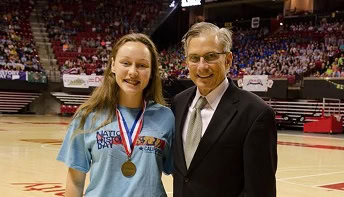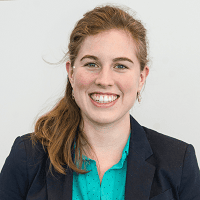You might describe National History Day (NHD) as the history nerd’s answer to a science fair. The process is very similar: interested students spend many hours of after-school time pondering a question and present their findings before a judge. Science students come up with hypotheses, while history students create thesis statements. And just as a baking soda volcano or potato clock won’t attract much attention at the Google Science Fair these days, a cut-and-paste biography of George Washington won’t pass muster at NHD.
Getting to the national stage is an intense process for students and their parents. Qualifying local and state competitions take place across the country during the academic year, all leading up to the national contest, which is held every year at the University of Maryland, College Park. Professionals, educators, and history enthusiasts can volunteer as judges during the multi-day event. Thousands of students from grades 6 through 12 present their work in one of five ways—as a documentary, an exhibit, a paper, a performance, or a website; students compete as individuals or within small groups.
This past June, I joined some of my fellow AHA staff members in serving as NHD judges. The theme of this year’s competition was “Leadership and Legacy,” broadly defined. Students were asked to study people, organizations, or movements that represented significant leadership, not necessarily great leadership. I helped judge individual exhibits for high school entrants. Design elements and historical merit are the main criteria for this category. Upon entering the exhibit hall, I noticed that many students had picked the usual suspects for their topics—there were more display boards flashing the names Eleanor Roosevelt and Nelson Mandela than I could count.

The winner of the Senior Individual Exhibit category at National History Day 2015 was Stacey Olson of Santa Rosa, California. Photo courtesy of Gary Pettit, NHD
Upon a closer look, however, it was clear that even projects featuring commonly studied characters were infused with strikingly unique and personal elements. Display boards embedded with Korean wallpaper, family heirlooms, video screens, spinning bicycle wheels, and other materials transformed the NHD exhibit hall into a mélange of colors and sounds. Projects that displayed impressive qualities of engineering, craftsmanship, and even scientific analysis demonstrated that NHD is a truly interdisciplinary competition. Some of the students freely admitted that they didn’t want history to become their main focus in college or future careers but still saw the discipline as relevant to their interests; one analyzed the leadership of an innovative doctor she hoped to emulate in medical school one day.
School contests have received criticism in recent years for placing too much focus on competition itself. At National History Day, I noticed nerves fluttering in both students and their watchful parents. While many of these young men and women have large support groups in their schools and communities, in the end each one is left to face the judges alone. One by one, entrants were called forward to participate in a short interview in which any part of their research or presentation was subject to questioning. Fortunately, however, the students expect hard-hitting questions, and a judge must be prepared to give insightful comments. I would argue that the competitive aspect of NHD prepares students for the rigors of getting into college and applying for jobs later in life.
There is also a certain brazen fearlessness that defines NHD students that can be rare even in seasoned professional historians—for better or worse. Many young competitors, unaware of real or perceived barriers in the profession, had no hesitation in reaching out to experts for interviews or contacting famous archives directly for research material. One group of students from Massachusetts received national attention for writing to the incarcerated gangster Whitey Bulger asking for personal insight into his leadership qualities. Shockingly, they received a letter back. While the teens admitted that the mobster “did not really reply to any of our actual questions,” the letter will almost certainly become a valuable resource for future Bulger biographers.
The theme for the upcoming 2016 competition is “Exploration, Encounter, and Exchange in History,” which was chosen to “provide an opportunity for students to push past the antiquated view of history as mere facts and dates and drill down into historical content to develop perspective and understanding.” NHD organizers welcome volunteers of all types, and I encourage everyone who is interested in history to serve as a judge at least once. To view the 2015 winners or to volunteer for a competition in your area, please visit www.NHD.org.
This work is licensed under a Creative Commons Attribution-NonCommercial-NoDerivatives 4.0 International License. Attribution must provide author name, article title, Perspectives on History, date of publication, and a link to this page. This license applies only to the article, not to text or images used here by permission.

